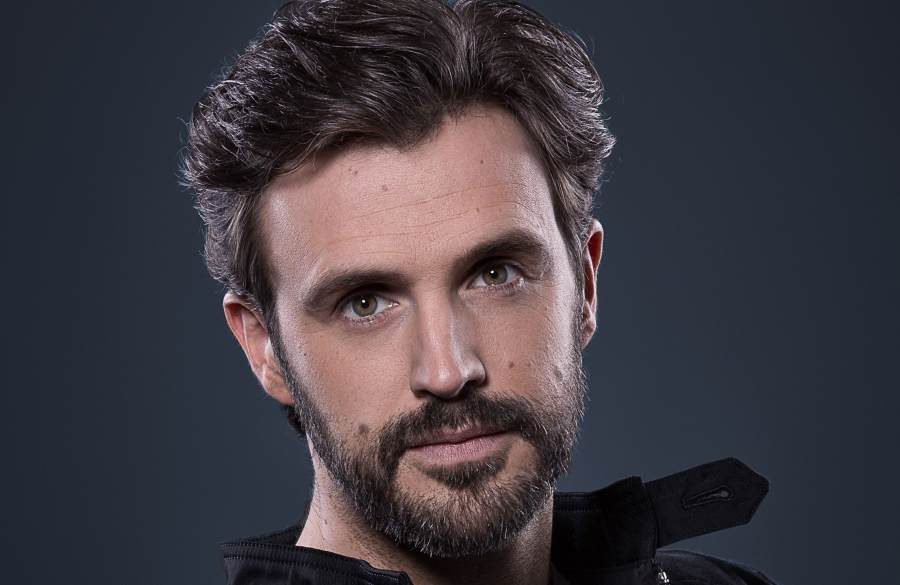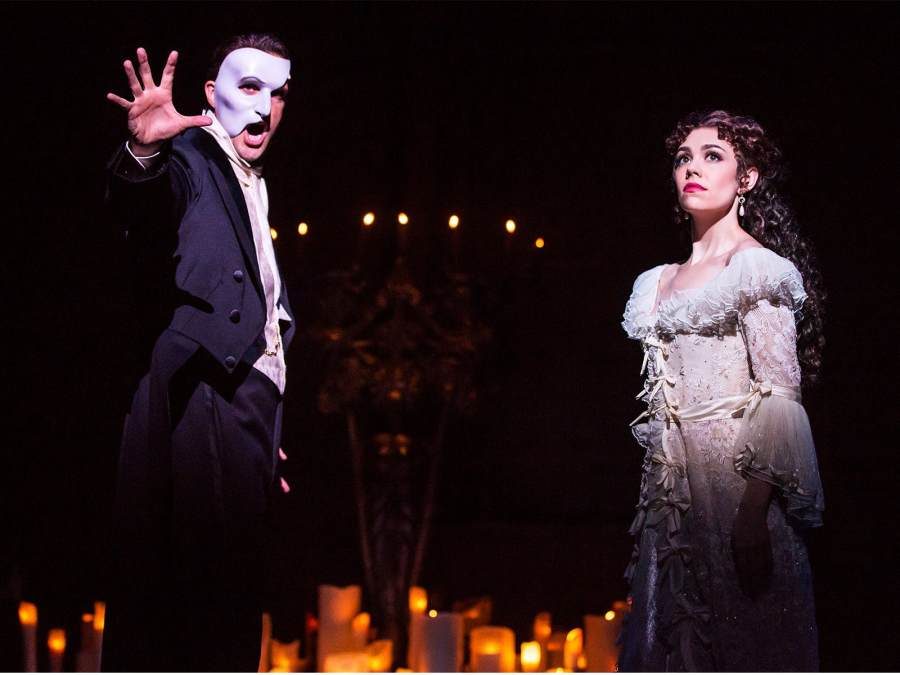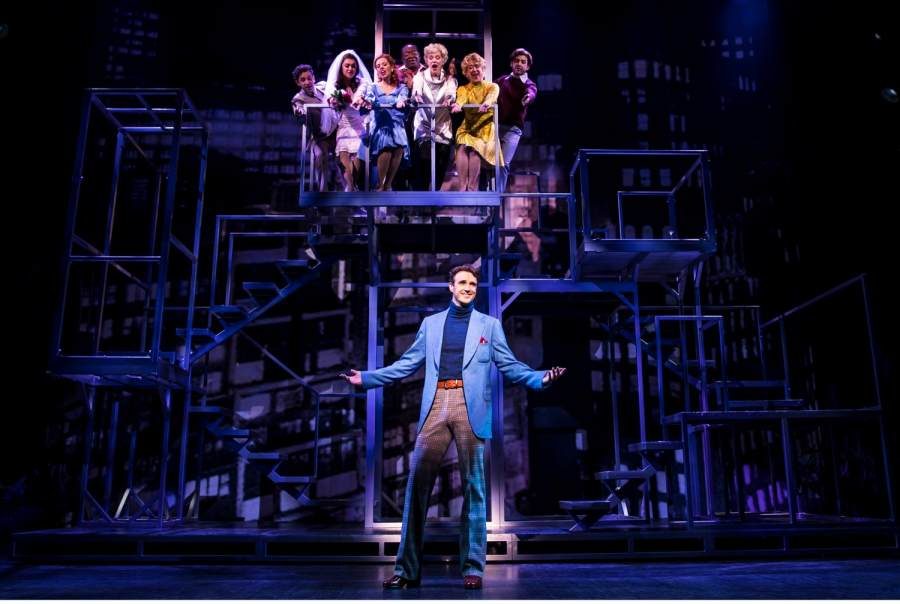

Two-time Olivier Award nominee Michael Xavier recently took Broadway by storm playing opposite Glenn Close in this year's revival of Sunset Boulevard. Only weeks later, he's back at the Great White Way starring in Prince of Broadway. We caught up with him about working with Hal Prince, playing some of the great roles in the American theater, and what it's like working in New York versus London's West End.
It seemed like a really, really fun and exciting thing for an actor to get to play all those roles and work with Hal Prince and Susan Stroman.
Yeah. It's kind of the dream job, really working with such an amazing creative team and cast as well. It's an incredible group of people. As an actor getting to play all the different characters in different shows, putting on a different hat every few minutes is what I love to do, so it's a dream.
What was it like to be in a room with Hal Prince as he revisited all of these shows that have been such integral steps in his career? Did he have amazing stories? Also, what was it like to portray these roles that have become such important parts of musical theater, and Broadway, and just culture in general in this day and age?
Firstly, being in the room with Hal and Susan and Jason Robert Brown was just a...I mean, initially, you could say it could have felt really intimidating, but they're such lovely, encouraging people that actually what was great about it was they allowed us to kind of find the freedom within those original performances. Hal was obviously wanting to kind of nod towards those originals, those first performances and first productions, the way that obviously the set is designed and the costumes are designed. William Ivey Long has basically designed the costumes around the originals. In terms of the performances themselves, I was kind of expecting Hal to want us to replicate what he had worked on originally, but what was great was he was willing to allow us to have some kind of creative freedom within that and bring our own kind of performance to the table which was quite refreshing. Actually, I didn't expect that to happen.
In terms of portraying those characters, I always try not to watch performances of parts I'm about to play. I've done a lot of revivals over the years, and I never like to see another actor's portrayal of that performance, of that particular character, because I like to take it from the page, and take it from my own viewpoint. What I tend to find happens when I watch somebody else's performance is I kind of subliminally take on board the way they have brought a character to life, and then what I'm doing then is I find that I'm starting to replicate what I've seen, rather than trusting my instincts as an actor from the page itself, and taking it, you know, kind of building it into life from that ground floor up.

How do you approach playing so many different roles in one show, and since you're only doing snippets from each production, are you imagining the characters within the context of the production numbers you’re doing or within the greater scheme of the entire show?
You're trying to slip into the context of the show itself. I think what's great is, with these costumes, they're so bold and kind of definable that once you've put the costume on, you suddenly slip into this different persona. You know, for instance, this song “You Must Meet My Wife”, from A Little Night Music, the minute I put the mustache on, it transforms me into this old English gent, which obviously comes kind of easily, but you know, it's things like that, it's moments like that that I find, with a particular hairstyle or wig or a certain element of costume that I suddenly think, "Right, okay, this is this character now," and it helps you to just slip into it really quickly.
I know that you've done some Hal Prince musicals in the past. You were in Phantom of the Opera and The Pajama Game on the West End. What’s it like, as an actor, to re-visit these musicals with the man who was behind them at the very beginning?
Well, it's great. In terms of Phantom itself, obviously I know the show well, because I did it for a year in the West End, like you said. And you know, I've kind of always thought, "Oh, you know, it would be nice to play Phantom one day," but I've always thought, "I don't really want to do the 75th Phantom," you know? I'd quite like to do a new production myself, create something, rather than going into the version that's been running for so many years, and ideally I'd love to create something new with it. And what was great about this was obviously I get to play Phantom for essentially two songs. But Hal was kind of willing to play and not necessarily replicate exactly what is done in the production right now. One of the stage managers is actually working on Phantom of the Opera, well, has taken a sabbatical from Phantom to come and do this show, and so during rehearsals, before Hal came into the room, he kind of marked through how it's done at the minute on Broadway. And so, you know, Hal came into the room, and we started doing it, he was standing there saying, "Why is he going over there? What's he doing there?" You know? He was ready. He was like, you know, there's no sets, we're not necessarily replicating this, so try this, try that, try this, and there was a moment when I was with Kaley Ann Voorhees, who's playing Christine, and I was going to lay her down, like he does in the show on the floor, so I lay my cape on the floor, and I was going to lay her down. "What are you doing? What are you doing with the cape? What is this?" So we did a version where I just kept Kaley Ann in my arms, and finished the song still holding her, and he said, "Well, that's what we did the first time!" You know? So originally with Michael Crawford, he was holding Sarah Brightman, and Hal said, "Yeah, Michael Crawford did that originally," and then I think had a back injury at one point and they stopped doing it, and no one from that point on ever finished “Music Of The Night” holding the Christine. Yeah, so it's great that I'm actually now doing the original blocking, the very, very original blocking that Hal decided on. So pretty cool.
Have you heard any other stories like that? Like of where blocking came from originally, or how these really monumental moments came to be, in his mind?
Yeah, we've had many. There have been moments when he’s kind of stopped the rehearsals to say, "Oh, this happened then, and this is what went on then," and my memory is so bad I always forget them, but what sticks in my head is he was saying about how Stephen Sondheim, they were about to do the first run of A Little Night Music, and Stephen Sondheim wanted a song for Desiree, and just before, in the dinner break before, they were going to do a run in the afternoon, so in the lunch break, Steve, as he calls him, went up to Hal and said, "Look, you know, I've got this song. It's a bit hokey, I'm not really a big fan of it, but it might be something we could use for Desiree at this part of the show," and so he sat down and he played it, and the lady who was playing Desiree originally, said, "well, you know, I like it. Well, why don't I just stick the music on my lap and I'll give it a go, and we'll put it into the run this afternoon. Anyway, the song was "Send In Clowns", which is now one of the most famous Stephen Sondheim songs of all time. And from the fact that Stephen was saying, you know, "Ah, this song, it might be a bit hokey, you know? It might not work," so you know, it's just interesting how moments like that, in history, certainly in the musical business history, where a composer can say, you know, "What about we just try this?" And all of a sudden that becomes such an iconic part of musical theater history. It's almost like serendipity, if you like.

In the show, every performer sort of takes on the role of Hal Prince at some point, and sort of narrates as Hal. Was that book written before the actors came into the rehearsal room?
It was, but we've changed it. They did a production in Japan a few years ago. So many of those things were already written, but in Japan, I believe the version was a voiceover of Hal actually speaking the stories himself, but Hal decided he wanted us to portray him, rather than have his voice. Hal was kind of hell bent on the show not being about Hal. He didn't want it to be too self-indulgent or self-involved, so, you know, he was trying to steer away from that as much as possible, but of course, you know, it's about Hal. I mean, he’s worked in the industry for decades and he's so instrumental in shaping musical theater. Of course it's about him, and people want to know about him. So, you know, I think it's difficult to steer away from that.
You recently made your Broadway debut in Sunset Boulevard, if I understand correctly, and that's a role that you originated in the revival on the West End. Are there any major differences between Broadway and the West End, just in terms of the way that they do things?
It’s a very similar industry. I think there's something about Broadway that is more exciting in the sense that I think the audiences on Broadway get so kind of excited to come to Manhattan and to come and see the shows that there's a real energy, buzz in Midtown, that I don't know, it's just not quite the same in the West End. It just doesn't have the same excitement. I mean, don't get me wrong, it's great working in London's West End, but there's something about Broadway, I think being the home of musical theater, being the place where that all started. You know, there's something about that here which is tangible and exciting and the stage doors are always packed full of people wanted to have photos and autographs and it's not quite as crazy in London. And it's fun. It's fun. It's great to be part of, and also the theater community here, I think probably because geographically, the center of Broadway, you know, the center of the theaters are all kind of conversed in one area. It feels more like there's a real sense of theater community. Everybody drinks in the same bars that are nearby and, you know, there's a real sense that everybody kind of hangs out together, whereas in the West End, it's much more geographically spread, so you know, it's not always the same way, the same vibe, if you like.
And I would imagine that for this show, where you guys are performing so many songs that people know and love, the audiences are just so excited?
What's great is there's a real range of ages as well. You know, it's kind of appealing to everybody, because there's obviously those young kids who may have gone and seen Phantom at a young age, you know, which is obviously still running, you know, they kind of relate to Hal in that way, and then there's obviously the older generation of theatergoers who saw maybe the original follies or something, many years ago, and they're coming back for the nostalgia of having seen that back then. So it kind of appeals to everybody, in different ways. So there's so many great shows, and as you've seen, there are so many different types of shows, from Phantom to Cabaret, you know, it's such a different feel. A Little Night Music. It's got all these different styles of shows, within one night.
My last question is do you have a favorite number of the show that you're in and also one that you're not in?
I mean, I love "Being Alive". It's such a great song, and it's such a great character. So "Being Alive" would be my favorite that I get to perform. A song that I'd love to perform, oh, there's so many. Well, I enjoy... Obviously, normally when we're offstage we're changing into another outfit, so we're not getting a chance to actually see anybody, but one of the numbers that I get to watch from the wings, just before I enter, is "The Right Girl", with Tony Yazbeck. The amazing tap number that he does. I just watch that every night and just stand there in awe of him. He really is an incredible dancer, and I just wish I could dance like him. So if I could dance like Tony, I'd love to do that number.